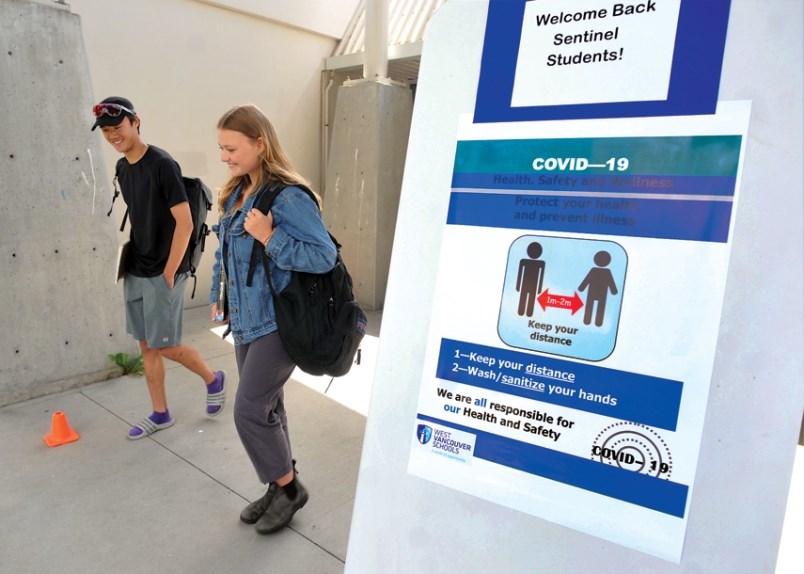Parents and teachers on the North Shore are having mixed reactions to the announcement that most public school students will be heading back to the classroom in September.
Education Minister Rob Fleming announced a return-to-school plan July 29 that will see “most students returning to the classroom fulltime.”
Provincial health officer Dr. Bonnie Henry acknowledged the return to school won’t be without risk, but said that needs to be balanced against the adverse impacts of being out of school on many children and families.
“For students, being in class is about learning, about being in class, about seeing friends,” she said. Henry said that having children in school is also essential for many parents “to be able to work and to be able to cope with this pandemic.”
For North Vancouver mom Samantha Collier – who has three children in school on the North Shore – hearing Henry’s stamp of approval on the plan is important.
While acknowledging sending her kids back to school will be “a bit scary”, Collier said she trusts the health officer’s advice. “Bonnie Henry has done a tremendous job,” she said. “She’s the expert.”
Hearing health experts say younger children are less prone to getting ill with COVID-19 than adults has also been reassuring, she said.
Collier said trying to work from home while her kids were out of school this spring was challenging. Her older two teenage kids have also been “very stressed out by not seeing their friends,” she added.
Stephanie Dodd, whose six-year-old son attends North Vancouver’s Queen Mary school, also has mixed feelings. While teachers worked hard to make online schooling happen in the spring, missing “the social aspect was hard,” she said. “All he had was us, (his parents), and we were super busy.”
But the prospect of sending her child to school with a possible second wave of the virus looming still gives her pause, said Dodd. “Is this right? I don’t know,” she said. “It makes me feel really nervous.”
Anna Belluz is one parent who doesn’t plan to send her daughter, who is going into Grade 12 at a West Vancouver high school, back to school this fall.
“The idea of everybody going back to school is a very hopeful one,” said Belluz, who is also an educator who runs online camps for kids. But Belluz said she’s not convinced reality will match the hope.
“Honestly we are better safe than sorry at this point,” she said.
Belluz said most parents she knows plan to keep their kids at home and homeschool or sign up for distance education.
“People are looking at this as an opportunity to really change up the way we’re doing things,” she said.
Under the plan announced by the province, students will be divided into “cohorts” of about 60 children who they will have recess and lunch times with and be able to play outside with. The idea is to limit the number of children who regularly interact with each other so that chains of transmission can more easily be isolated and tracked if there was a case of COVID-19 in a school.
Bigger changes are afoot at the secondary school level, where students will be divided into cohort groups of 120 students.
To accomplish that, it’s likely that school timetables will go through some significant revision from the current models.
“It really shifts how we think about high schools,” said Chris Kennedy, superintendent of the West Vancouver School District.
The usual system where students take eight classes in rotating blocks “doesn’t seem feasible under this system,” said Kennedy.
Under the plan, most students will not take part in a “hybrid” model, combining online and in class learning.
Possible exceptions are large high schools with over 1,500 students.
According to the ministry of education, enrolment at Handsworth Secondary in North Vancouver is hovering right around that number.
School districts are expected to inform parents of their plans no later than Aug. 26.
Andrea Sinclair, president of the BC Confederation of Parent Advisory Councils, said according to a survey of parents conducted by the ministry of education, most parents want to see their kids return to the classroom. “Overall the majority of B.C. parents found it incredibly difficult to support their children academically, while working from home full time,” she said.
Reaction from teachers to the plan was lukewarm, with B.C. Teachers Federation president Teri Mooring saying teachers need more time to plan for a full return to the classroom.
Renee Willock, president of the West Vancouver Teachers Association, said she was surprised by the announcement of a full return to school for high school students.
“Older students spread the virus the same as adults do,” she said. “High schools are big busy places.”
Stephen Price, who teaches elementary school at Eagle Harbour Montessori in West Vancouver, said he welcomes the idea of getting back to the classroom, but would like more time for teachers to plan.
Price said he’s also concerned that plans for school in September vary significantly between provinces, and would like Henry to walk teachers through the science behind B.C.’s plan to return to the classroom full-time in a detailed manner.
Under the plan, families who don't feel comfortable sending their kids back to the classroom have the option of signing up for distance learning programs or homeschooling their children.
Both Henry and Fleming said public health officials will be monitoring school re-openings in the fall and will be prepared to step in and make changes if they see cases of COVID-19 community transmission ticking up.
Masks will not be mandatory in schools but will be made available for students and staff who want them. Older students will also be encouraged to wear masks in situations where they can’t maintain a safe distance with those outside of their learning groups, such as riding the bus to school.



